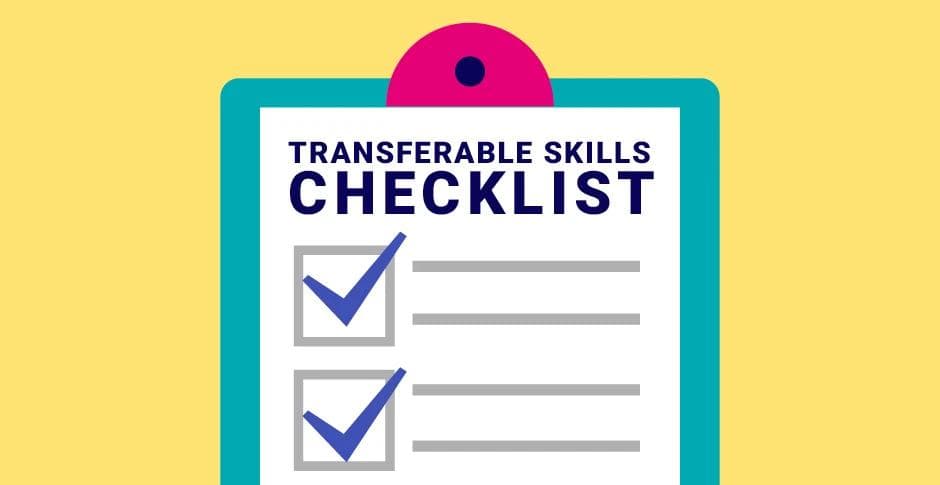Throughout your working circle, whether you have been working at the same job for decades or constantly changing jobs, there is one thing for sure that will not change is that you will need to equip yourself with expertise skill sets in a specific job, such as how to use a tool for work and the necessary transferable skills like communication skills, teamwork or creativity…These transferable skills will make it easier for you to switch jobs because they are the skills that help you adapt and do well in any specific role. In addition to professional skills and experience, it will also be the key to opening unlimited career opportunities for you.So, what exactly are transferable skills? And why are they important so much for your career? Let's find out together with Rapid Resume in this article.
 In reality, there are so many different transferable skills, but employers will only look for the most important skills in candidates, which are also the key to helping employees do well in every assigned job, as also enabling them to develop from a good employee into an excellent one. Let's take a look at the skills listed below with Rapid Resume and see if you already possess these skills.
In reality, there are so many different transferable skills, but employers will only look for the most important skills in candidates, which are also the key to helping employees do well in every assigned job, as also enabling them to develop from a good employee into an excellent one. Let's take a look at the skills listed below with Rapid Resume and see if you already possess these skills. To adapt to the changing industries and the global working environment, employers will always look for professional candidates who are flexible to significant changes in the market, have a continuous learning attitude, and improve their skills regularly to maintain trends, thereby becoming more efficient and productive. They won't know if you have these skills unless you show them. If you don't mention them enough at the resume or cover letter writing stage, the chances that you won't receive many positive responses are very high. So, make sure to include specific examples in your work experience section that demonstrate each of these skills to the recruiters, and try to quantify them with numbers where possible in your resume. Last but not least, let's equip yourself with any missing transferable skills that are already mentioned in the blog today if you find yourself wanting to increase your values as well as enhance your chances of shooting your dream job. Good luck on your job search journey!
To adapt to the changing industries and the global working environment, employers will always look for professional candidates who are flexible to significant changes in the market, have a continuous learning attitude, and improve their skills regularly to maintain trends, thereby becoming more efficient and productive. They won't know if you have these skills unless you show them. If you don't mention them enough at the resume or cover letter writing stage, the chances that you won't receive many positive responses are very high. So, make sure to include specific examples in your work experience section that demonstrate each of these skills to the recruiters, and try to quantify them with numbers where possible in your resume. Last but not least, let's equip yourself with any missing transferable skills that are already mentioned in the blog today if you find yourself wanting to increase your values as well as enhance your chances of shooting your dream job. Good luck on your job search journey!

What Are Transferable Skills?
Transferable Skills are skills that a person can use in many different work environments, industries, or different situations. These soft skills are not limited to a specific industry but can be widely applied and be effective in all cases where they are used.Transferable skills become extremely important when you want to change jobs or move into another job or industry. You will not waste time learning these necessary skills from scratch, as well as save you precious time learning new skills on your own.Transferable skills are not just considered as a single skill but a combination of many other skills. Such as communication skills, self-awareness, teamwork, time management, problem-solving, analytical skills, and personal development... A person who possesses many transferable skills often easily adapts to new jobs or different industries. By developing and focusing on enhancing these skills will definitely not only help you to create more opportunities in your future career, but it will also be helpful in your current work environment.Why are Transferable Skills Important?
Transferable Skills" plays an important role in your career as well as your personal development for the following reasons:Career flexibility: With transferable skills, an individual can easily move from one career to another, expanding career opportunities and increasing their career stability.Adapting to changes: In a world where technology and industries are constantly changing nowadays, possessing transferable skills helps individuals easily adapt to changes and continue to thrive.Personal development: Transferable skills are useful not only at work but also in personal development, helping people become self-managed, self-learners, and able to face challenges in the most confident way.Enhancing work efficiency and job performance: Transferable skills such as time management, problem-solving, and teamwork also help to increase efficiency and effectiveness in any work situation.Building relationships: Some communication and teamwork skills help people create and maintain quality relationships in the work environment as well as in their personal lives.Coping with risks: In the context of an increasingly changing and uncertain labour market, possessing transferable skills helps individuals stay motivated, continue to grow and seek for new opportunities.Increased employment opportunities: People with a variety of transferable skills are often prioritized in the hiring process because they can take on a variety of positions and roles.Top 10 Transferable Skills That Never Get Old

#1. Critical Thinking Skills
Nowadays, critical thinking is a highly valued skill in life, especially in schools and businesses. Many people think that critical thinking means liking to argue and criticize others. However, it was a misconception. In reality, critical thinking is completely different. Critical thinking skills help workers think clearly and observe things from the most objective aspects. From there, it will create accurate and constructive arguments, bringing optimal results to the debate.Just reading and understanding information and evaluating right or wrong is not enough. The evidence and proof behind why it is right or wrong is what matters for the final decision. This skill will help you optimize the right decisions during your work. For example, when signing a contract with a customer, you must carefully consider the partner and whether the contract terms are reasonable or not before making the final decision.#2. Collaboration Skills
Teamwork is one of the most important skills that anyone needs to have because no one can work alone forever and always needs cooperation with others. With its flexible nature and high applicability, teamwork skills are one of the core and most valuable skills that everyone should practice day by day. Therefore, this is one of the most used and most beneficial transferable skills.Teamwork skills are the ability to establish and maintain cooperation with group members to complete common tasks. In addition, effective teamwork also brings material and spiritual values to the collective as well as the individual. To work more effectively as a teamwork, you will need to adhere to the following small skills:- Listen to other people's opinions and suggestions.
- Ability to organize and assign work suitable to the abilities of team members.
- Ability to persuade and present to come up with the best method to solve problems that are almost agreed upon by members.
- Respect other opinions and always help team members.
- Always be responsible for the work assigned.
- Try not to be late in almost all circumstances so that the other members do not have to wait for each meeting and discussion.
- Do not deny the efforts of others; always praise and encourage your partners and colleagues.
- Accept criticism and feedback from other members.
#3. Time Management Skills
Time management skills are the ability to effectively organize and divide time to complete tasks and goals. It plays an important role in maintaining productivity and organization in daily work. Good time management skills will be key to completing tasks and meeting deadlines.Employers often appreciate candidates with time management skills because:- Increase productivity: Time management skills help you work more efficiently, optimize your time and focus on the most important tasks.
- Achieve goals: Dividing your time appropriately helps you accomplish your personal and professional goals more effectively.
- Create balance: This skill helps you balance work and personal life, thereby improving the overall quality of life.
- Prioritize work: Time management helps you identify and prioritize important tasks, thereby ensuring that you know how to manage your time effectively.
- Increased autonomy: The ability to manage your own time helps you demonstrate your own autonomy as well as your personal organization, thereby creating the confidence to maintain work and personal life.
#4. Active Listening Skills
Active listening is the ability to give your full attention to the person you are talking to. This includes not only hearing the words the person says, but also picking up on their emotions, facial expressions, as well as their body language.When you listen actively, you also show your interest and respect for the other person, as well as try to gain a deeper understanding of the actual message they are conveying.Active listening skills play an important role at work for the following reasons below:- Grasp information accurately: Active listening helps you grasp key information and better understand the project, task or issue being discussed.
- Better interactions: This capability creates opportunities for positive interactions with colleagues and superiors to exchange ideas, build trust and maintain a strong relationship
- Creating trust: Active listening shows interest and respect for the other person, contributing to creating trust and commitment in the working environment.
- Improve teamwork: Active listening helps you understand your teammates' perspectives and viewpoints, thereby optimizing the teamwork process.
- Personal development: The ability to actively listen helps you learn from others in so many ways, and it’s gonna help to improve your own knowledge and skills.
- Better problem solving: Understanding other people's perspectives can help you find better solutions to the challenges and problems you are facing.
#5. Leadership Skills
Leadership skills are often understood as skills only for leaders, for those who manage others, superiors or bosses. This is only partly true because sometimes we as individuals also need this skill to "lead ourselves".In practice, leadership skills can help a person have a more comprehensive view of their work. From there, they could organize and manage their work better and coordinate with others more smoothly. Whether in a management position or leading a small project, leadership skills are always important.A good leader needs to be decisive, upright, fair, sensitive to problem-solving, able to establish relationships between members, have the ability to guide and be willing to accept risks.Currently, in most businesses, the issue of supporting the construction of strong teams and ensuring smooth work and high results is highly valued. Therefore, a candidate with leadership skills will score highly in the eyes of employers and have a very high chance of being selected. Even though you may not be a manager now, who knows, maybe one day you will become a leader and cultivating this skill early will help you be ready to take on a leadership role in the future. You will feel lucky that you did not remove this skill from the list of top transferable skills that you need to learn and improve. That’s why it's better to keep in mind that: “ Please do not have a closed mindset that you must be a leader for leadership skills to be necessary.”#6. Research and Analytical Skills
Research and analysis are two transferable skills that go hand in hand to help us work more scientifically and effectively, as well as easily to complete new tasks.Whenever we undertake or are assigned a new task, especially something we have never done, in-depth research and analysis of related issues is a prerequisite to understanding clearly what we need to do, where to start, and how to carry it out. Analytical skills also help us not miss any important aspects that need to be done to complete the job and achieve the final goal.#7. Adaptability Skills
The ability to adapt quickly is essential in an ever-changing era. The ability to flexibly adapt to changes in work and society helps us not fall behind. This is one of the soft skills everyone should have, demonstrating their ability to adapt well to all changes in any circumstances.Nowadays, most employers highly appreciate candidates who can adapt well and withstand pressure at work. When a candidate can adapt well to any environment, they can easily integrate and still be able to perform their tasks in a smooth way. For jobs with a stressful working environment, candidates should add this skill to their resume to make it stand out.The world is constantly moving and the Covid pandemic also makes people have to learn how to quickly adapt to change, having adaptive skills has become an extremely necessary thing at work, especially for those who want to change jobs or careers, quick adaptability in a new environment is even more of a prerequisite for success.#8. Project Management Skills
Project management skills are important not only for project managers but also for everyone who should equip themselves with these skills. No matter the position you are taking responsibility for in your company, there will be at least one time when you have to work with many people on different projects. Project management skills include the ability to plan, organize, execute and monitor projects from inception to completion. People with strong project management skills can clearly define project goals, develop detailed plans, allocate resources, track progress, organize work, as well as ensure everything is done more smoothly and efficiently, which will be of great help when any unpleasant or bad problems arise, it can be handled more optimally.#9. Problem-Solving Skills
This is one of the extremely important and indispensable soft skills in life. It can be understood that problem-solving skills are the ability to analyze, evaluate, and make the most optimal decisions in handling every situation in life. Thanks to the ability to quickly respond and solve problems in various ways, you will be able to master problems that arise in the most calming and patient way.Whether it's solving technical problems, resolving conflicts between team members, or mapping out strategies to improve processes, the ability to approach problems systematically and come up with creative solutions will always be highly valued by employers.Especially for candidates who do not have much experience but can offer activities that apply this skill on their resume or cover letter will definitely create a very good impression on employers.#10. Interpersonal Skills
Interpersonal skills are skills that focus on building positive relationships and collaborating effectively with others. These skills are related to the ability to communicate clearly, interact and empathize with others, persuade, listen, as well as resolve conflicts diplomatically.Interpersonal skills are important skills for the following reasons:- Build good relationships: Interpersonal skills help you communicate and interact effectively, building good relationships with people around you. This is very necessary for work, study, and life.
- Effective teamwork: With good interpersonal skills, you can work effectively in groups, contributing to common goals. You will become a valuable contributing member of your group or team.
- Persuading and influencing others: Communication, persuasion, and negotiation skills help you convey messages and influence other people's decisions. This is useful in any job related to leadership, sales, and management positions.
- Conflict resolution: With interpersonal skills, you can resolve conflicts and disagreements, avoiding escalation of tension. This keeps a harmonious and healthy working environment.
- Personal development: Practice interpersonal skills makes you more confident in communication and improves your ability to adapt and master all situations related to human beings.
Transferable Skills: Key Takeaways for Your Resume
Transferable skills make you more employable and less dependent on the hiring manager's decisions. It gives you active power in choices and allows you to react to the job market and industry changes. However, bear in mind that you can not just list out “ transferable skills” on your resume in a lack of science way because there are many such skills to consider.When listing transferable skills on your resume, it's important to do so in a thoughtful and meaningful way, only pick the best applicable ones and try to demonstrate them through examples and real achievements. Because "the results and evidence speak for themselves".Additionally, on your resume, there are several different places you can utilize to highlight your transferable skills, which include the ones listed below:- Career Summary or Objective
- Employment history descriptions
- Skills list
Related article about this topic is available here: How to Showcase Transferable Skills on Your Resume & Cover Letter
Conclusion

